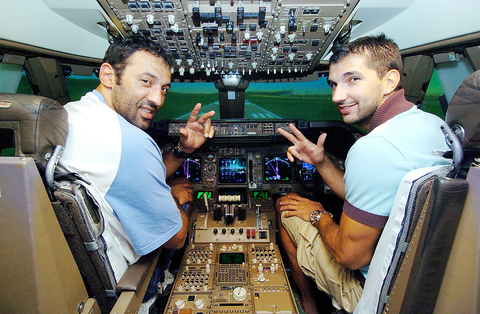Taiwanese airlines yesterday welcomed Premier Frank Hsieh's (謝長廷) announcement that the government will allow them to fly through China's air space, although a formal arrangement still has to be hammered out in negotiations between the two governments.
"It is good news for both carriers and consumers, who will be able to shorten their flying time," said Nieh Kuo-wei (
EVA Airways, the nation's second-largest carrier, said the new measure could help the company save between NT$150 million (US$4.7 million) and NT$200 million in fuel costs, although passengers would undoubtedly be the biggest beneficiary.

PHOTO: FANG PIN-CHAO, TAIPEI TIMES
Nieh said that six of EVA Airways' routes could be changed to fly over China's air space, which would strengthen the carrier's competitive edge.
Flying over China would shorten the Taipei-Paris route by one hour to 11 hours. Ten to 15 minutes could be shaved off the Taipei-Hanoi route, and the cargo flight between Taipei and New Delhi or Mumbai could be shortened by 15 to 30 minutes.
Boosted by the latest cross-strait development, share prices of EVA Airways soared 4.7 percent to NT$15.75 on the Taiwan Stock Exchange yesterday.
China Airlines (
However, the government will first have to issue formal documents making legal provision for flights across China, following which carriers will have to apply for approval from the Chinese government, Nieh said.
"There's nothing special in this case, as we all have to follow the customary practice of getting approval from the nations whose air space our aircraft will have to fly across," he said.
Currently, airliners have to skirt China's air space as stipulated in the Act Governing Relations Between Peoples of The Taiwan Area and the Mainland Area (
China Airlines, the nation's largest carrier, said it will conduct an assessment to choose suitable routes for the application.
The company currently operates 19 passenger flights and 13 cargo flights to Europe per week.
"It's hard to say how much we can save before carefully calculating the range of effects it will create," said China Airlines spokesman Johnson Sun (
"But we'll definitely apply for approval for flights between Taipei and New Delhi, Hanoi and Vienna," Sun said.
On the question of whether Hsieh's proposal would pave the way for direct links between Taiwan and China, Sun said that if direct charter flights across the Taiwan Strait could be launched on a regular basis, it would certainly be a good thing.
"It's too early to say that the government's message will act as a prelude to the implementation of direct links," Nieh said.
"It still requires some time of observation as there are other obstacles to be removed," he said.

Sweeping policy changes under US Secretary of Health and Human Services Robert F. Kennedy Jr are having a chilling effect on vaccine makers as anti-vaccine rhetoric has turned into concrete changes in inoculation schedules and recommendations, investors and executives said. The administration of US President Donald Trump has in the past year upended vaccine recommendations, with the country last month ending its longstanding guidance that all children receive inoculations against flu, hepatitis A and other diseases. The unprecedented changes have led to diminished vaccine usage, hurt the investment case for some biotechs, and created a drag that would likely dent revenues and

Global semiconductor stocks advanced yesterday, as comments by Nvidia Corp chief executive officer Jensen Huang (黃仁勳) at Davos, Switzerland, helped reinforce investor enthusiasm for artificial intelligence (AI). Samsung Electronics Co gained as much as 5 percent to an all-time high, helping drive South Korea’s benchmark KOSPI above 5,000 for the first time. That came after the Philadelphia Semiconductor Index rose more than 3 percent to a fresh record on Wednesday, with a boost from Nvidia. The gains came amid broad risk-on trade after US President Donald Trump withdrew his threat of tariffs on some European nations over backing for Greenland. Huang further

Macronix International Co (旺宏), the world’s biggest NOR flash memory supplier, yesterday said it would spend NT$22 billion (US$699.1 million) on capacity expansion this year to increase its production of mid-to-low-density memory chips as the world’s major memorychip suppliers are phasing out the market. The company said its planned capital expenditures are about 11 times higher than the NT$1.8 billion it spent on new facilities and equipment last year. A majority of this year’s outlay would be allocated to step up capacity of multi-level cell (MLC) NAND flash memory chips, which are used in embedded multimedia cards (eMMC), a managed

CULPRITS: Factors that affected the slip included falling global crude oil prices, wait-and-see consumer attitudes due to US tariffs and a different Lunar New Year holiday schedule Taiwan’s retail sales ended a nine-year growth streak last year, slipping 0.2 percent from a year earlier as uncertainty over US tariff policies affected demand for durable goods, data released on Friday by the Ministry of Economic Affairs showed. Last year’s retail sales totaled NT$4.84 trillion (US$153.27 billion), down about NT$9.5 billion, or 0.2 percent, from 2024. Despite the decline, the figure was still the second-highest annual sales total on record. Ministry statistics department deputy head Chen Yu-fang (陳玉芳) said sales of cars, motorcycles and related products, which accounted for 17.4 percent of total retail rales last year, fell NT$68.1 billion, or